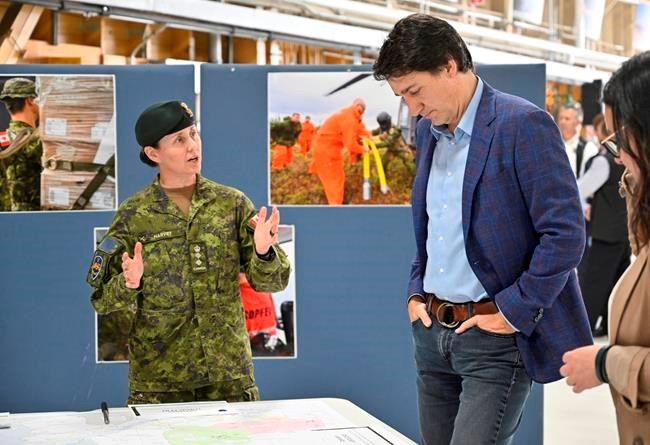SAGUENAY, Que. — Canada will continue to rely on foreign crews to help fight wildfires in the coming years, Prime Minister Justin Trudeau said Wednesday, as more reinforcements from abroad were expected to join the fight against the country's worst wildfire season in decades.
Trudeau told reporters in Saguenay, Que., that Canada will count on other countries to send help, just as other countries depend on Canadian firefighters.
"In terms of international firefighters, it's something that we count on during our fire seasons, but the same way our international friends and partners count on Canadian firefighters during their fire seasons," he told reporters after meeting with Armed Forces members at Canadian Forces Base Bagotville.
"From Northern Hemisphere to Southern Hemisphere, from one region of the world to another, the fire seasons aren't always aligned and that allows for a travelling of resources that is part of how we're going to make sure we're protecting communities all around the world."
Trudeau said extreme weather events are expected to become more frequent in the coming years due to climate change. When asked if Canada needs to augment its fleet of water bombers used to fight fires, he said it's clear the country will need to increase resources at many levels.
"There will be more climate emergencies, there will be more major challenges and so we will have to prepare," he said. "And yes, we are talking about planes, but we are also talking about more training for the population, for firefighters, for the military."
Meanwhile, more firefighters from abroad arrived on Wednesday to help battle Canada’s worst wildfire season of the 21st century, as some parts of the country were left waiting for hoped-for rain to quell some of the most dangerous fires.
Quebec officials had said about 100 Portuguese and 140 Spanish firefighters were landing in Quebec City to join the contingents of French and American reinforcements that were already helping battle 130 forest fires raging across the province as of Wednesday morning.
About 5,000 firefighting personnel from multiple countries have been deployed across Canada to help battle the flames, and more are expected to arrive from Chile and Costa Rica in the coming days.
There were 459 fires across Canada on Wednesday morning, with 234 listed as out of control.
There was hope in Quebec that rainy weather this week would help douse the blazes, but officials said Wednesday morning not enough rain had fallen yet. The province's forest fire prevention agency — SOPFEU — said a wildfire continued to threaten the community of Lebel-sur-Quévillon, Que., located 620 kilometres northwest of Montreal, where roughly 2,000 people remained displaced.
Civil security official Jean Savard said 2,800 Quebecers remained under evacuation across the province, down from more than 13,500 late last week.
Rain was also in the forecast for a large portion of Western Canada, but officials said little water from recent storms reached a massive wildfire racing through woodlands south of Fort Nelson, B.C., that threatens access to a key highway.
The Peace River Regional District posted an evacuation alert Tuesday for a section of the Alaska Highway as the Donnie Creek fire reached within two kilometres of the route linking Yukon and northern British Columbia to the rest of the province.
The weather provided more help around Dawson Creek, in northeastern B.C., where downpours calmed the nearly 200-square-kilometre Kiskatinaw wildfire that's burning within a few kilometres of the community of Tumbler Ridge.
More than 2,750 people are currently under evacuation orders in Tumbler Ridge, the Peace River Regional District and the Northern Rockies Regional Municipality, Minister of Emergency Management Bowinn Ma said Wednesday.
The province's forests minister told a news conference Wednesday that parts of the province will see rain and cooler temperatures over the coming days but added that it will not take long for the landscape to dry out again given the underlying drought.
This report by The Canadian Press was first published June 14, 2023.
— By Morgan Lowrie in Montreal with files from Patrice Bergeron in Saguenay, Que., and Brenna Owen in Vancouver
The Canadian Press




